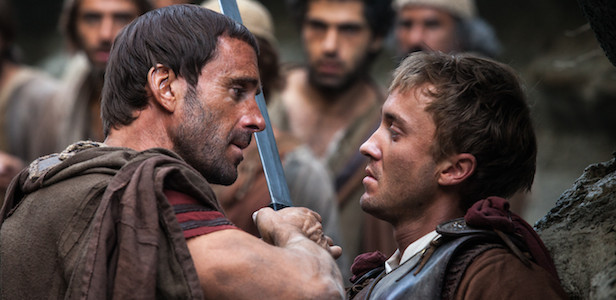
ReelBob: ‘Risen’
By Bob Bloom
The first half of “Risen” plays like a biblical mystery.
In 33 A.D. in Jerusalem, prefect Pontius Pilate orders his military tribune, Clavius, to make sure that the body of a crucified political prisoner remains entombed, so his fanatical followers cannot steal the body and claim — as foretold — that he has risen from the dead.
The tomb, of course, is indeed opened, and the body vanishes. Clavius is then tasked with either finding the body or those responsible for taking it. Pilate wants to quash rumors of a Messiah and to avert an uprising by the Jewish population prior to a visit by the Emperor Tiberius.
The tribune begins an investigation, interviewing suspects, digging up burial sites and pressuring informants.
Thus, what we have is basically a “C.S.I.: Judea”; an attention-grabbing whodunit. It’s a novel twist on the greatest story ever told.
Like all good investigators, Clavius discovers the lair where the followers of the dead man are hiding. He single-handedly raids the home — and “Risen” takes a turn for the worst.
It’s at this juncture that the movie changes from a compelling drama to one of those overly preachy Sunday-School features or a clichéd 1950s epic where the Roman nonbeliever is converted and instantly sees the light.
Basically, “Risen” becomes too literal, losing its mystery and deflating the remainder of the movie.
Director Kevin Reynolds, best known for directing such Kevin Costner turkeys as “Robin Hood: Prince of Thieves” and “Waterworld,” fails to sustain a promising premise.
By pulling the rug out from under the film’s main conceit so early, Reynolds, who co-wrote the script with Paul Aiello, changes the entire tone and dynamic of the film.
Instead of being a test of faith, “Risen” becomes a formulaic and pious bore that hobbles along, until its inevitable and unsatisfactory conclusion.
The second half of the film becomes one long sermon about faith and belief, told in a simplistic and near-condescending manner.
As Clavius, Joseph Fiennes gives a decent performance, especially in the first part of the film in which he uses his intelligence and wit to delve into what he believes is a conspiracy to foment revolution.
But after his encounter at the home he raids, he seems to lose all his wiles, continually staring wide-eyed and tagging along with his suspects, as they make their way from Jerusalem to Galilee.
His conversion is too swift and unbelievable for a world-weary and cynical man of his station and experience.
Peter Firth as Pilate does little except continually push Clavius to solve the mystery, while Tom Felton — “Harry Potter’s” Draco Malfoy — as Lucius, Clavius’ second-in-command, seems out of place and has really nothing to do.
Cliff Curtis as Yeshua brings a warmth and humanity to his portrayal of the resurrected prisoner.
Even though Curtis’s performance is one of “Risen’s” attributes, the movie would have been better served without his character.
“Risen” would have been a much improved film if it had stayed throughout with its original premise and offered a finale that was ambiguous and more a test of devotion.
Bloom is a member of the Indiana Film Journalists Association. His reviews appear at ReelBob (reelbob.com) and The Film Yap (filmyap.com). He also reviews Blu-rays and DVDs. He can be reached by email at bobbloomjc@gmail.com or on Twitter @ReelBobBloom. Other reviews by Bloom can be found at Rottentomatoes: www.rottentomatoes.com.
RISEN
1 1/2 stars out of 4
(PG-13), graphic violence, disturbing images